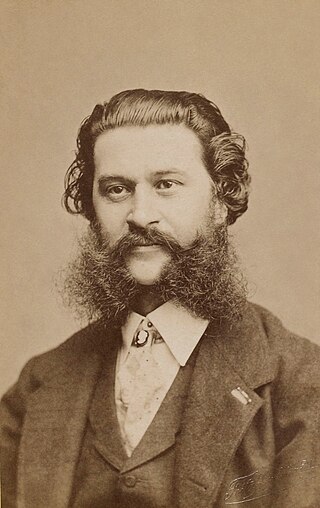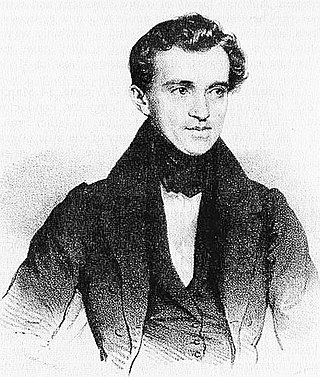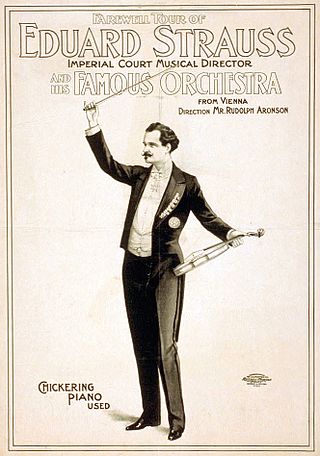Related Research Articles

Johann Baptist Strauss II, also known as Johann Strauss Jr., the Younger or the Son, was an Austrian composer of light music, particularly dance music and operettas as well as a violinist. He composed over 500 waltzes, polkas, quadrilles, and other types of dance music, as well as several operettas and a ballet. In his lifetime, he was known as "The Waltz King", and was largely responsible for the popularity of the waltz in Vienna during the 19th century. Some of Johann Strauss's most famous works include "The Blue Danube", "Kaiser-Walzer", "Tales from the Vienna Woods", "Frühlingsstimmen", and the "Tritsch-Tratsch-Polka". Among his operettas, Die Fledermaus and Der Zigeunerbaron are the best known.

Johann Baptist Strauss I, also known as Johann Strauss Sr., the Elder or the Father, was an Austrian composer of the Romantic Period. He was famous for his light music, namely waltzes, polkas, and galops, which he popularized alongside Joseph Lanner, thereby setting the foundations for his sons—Johann, Josef and Eduard—to carry on his musical dynasty. He is best known for his composition of the Radetzky March.

Josef Strauss was an Austrian composer.

Eduard "Edi" Strauss was an Austrian composer who, together with his brothers Johann Strauss II and Josef Strauss made up the Strauss musical dynasty. He was the son of Johann Strauss I and Maria Anna Streim. The family dominated the Viennese light music world for decades, creating many waltzes and polkas for many Austrian nobility as well as dance-music enthusiasts around Europe. He was affectionately known in his family as 'Edi'.

Claude Antoine Jean Georges Napoléon Coste was a French classical guitarist and composer.

Johann Maria Eduard Strauss III was an Austrian composer whose father was Eduard Strauss, whose uncles were Johann Strauss II and Josef Strauss, and whose grandfather was Johann Strauss I. Born in Vienna, he was unofficially entrusted with the task of upholding his family's tradition after the dissolution of the Strauss Orchestra by his father in 1901. His talents were not fully realized during his lifetime as musical tastes had changed in the Silver Age with more popular composers such as Franz Lehár and Oscar Straus dominating the Viennese musical scene with their operettas, although his uncle, Johann Strauss II, supervised his development as a musician, a fact disputed by Eduard Strauss.
Adolf AndreySchulz-Evler was a Polish-born composer.
Potpourri or Pot-Pourri is a kind of musical form structured as ABCDEF..., the same as medley or, sometimes, fantasia. It is often used in light, easy-going and popular types of music.

Cagliostro in Wien is an operetta in three acts by Johann Strauss II to a libretto by F. Zell and Richard Genée. It premiered on 27 February 1875 at the Theater an der Wien, featuring Marie Geistinger and Alexander Girardi.
Grillenbanner, opus 247, is a waltz composed by Johann Strauss II. Strauss himself conducted its premiere at a ball in the Sofienbad-Saal in February 1861. The work was dedicated to Prince Leopold of Saxe-Coburg-Gotha.

Herzenslust, Op. 3, is a polka composed by Johann Strauss II in the fall of 1844 for his debut as a composer at the Dommayer's Casino establishment in Vienna. It was performed along with several of Strauss' other early compositions, such as the waltzes Sinngedichte and Gunstwerber, and the Debut-Quadrille. Reviewing Strauss' debut, the journal Der Wanderer noted that both the Debut-Quadrille and the Herzenslust Polka "are so piquant in their inspiration, and handled with such glittering effect in the instrumentation that we […] have to recognise and commend the bold and exuberant talent of Strauss Son."

Waldmeister (Woodruff) is an operetta written by Johann Strauss II to a libretto by Gustav Davis. It was first performed on 4 December 1895 at the Theater an der Wien. Although not as popular as some of Strauss' other operettas, such as Der Zigeunerbaron and Die Fledermaus, it was given eighty-eight performances, and was much admired by Johannes Brahms, a friend of the composer.

Debut-Quadrille, Op. 2, is a quadrille composed by Johann Strauss II. It was one of four compositions that Strauss had written for his début as a composer at the Dommayer's Casino in Hietzing, Vienna in the fall of 1844. The composition is in standard Viennese quadrille form, with six sections, named: No. 1 Pantalon; No. 2 Été; No. 3 Poule; No. 4 Trénis; No. 5 Pastourelle; No. 6 Finale.
Charles Émile Waldteufel was a French pianist, conductor and composer known for his numerous popular salon pieces.
Oscar Fetrás was a German composer of popular dance music, military marches, piano pieces and arrangements.
Champagner-Polka, Op. 211, subtitled "A musical joke", is a polka by Johann Strauss II, written in 1858 for his successful tour of Russia where he performed in the summer concert season at Pavlovsk, Saint Petersburg, where it was played for the first time on 12 August 1858.
In music, Op. 199 stands for Opus number 199. Compositions that are assigned this number include:
References
- ↑ "Strauss II, J.: Edition – Vol. 23 CD". Naxos Music. 8.223223 . Retrieved 3 November 2008.